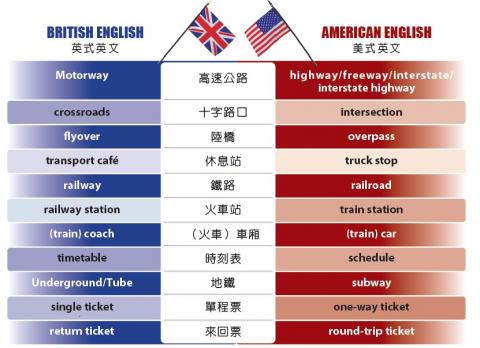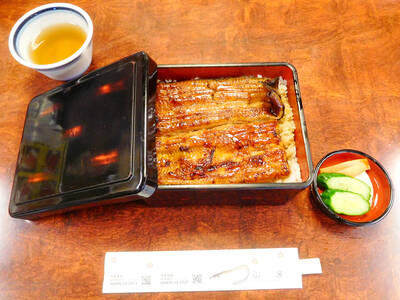The UK system of roads includes major high-speed limited-access routes known as motorways, with a network of smaller A-roads — with traffic lights or intersections — radiating out of London to other parts of England and into Scotland and Wales. In American English, the equivalents of the British motorway are the highway (sometimes with tolls), the freeway (never with tolls, hence the name) and the interstates/interstate highways extending across state lines.
There are other differences in road vocabulary between British and American English. In the UK, they talk about a crossroads, in America an intersection; in the UK a flyover for a section of road over another section of road or a railroad, called an overpass in American English; and a transport cafe in which to take a break during a long journey, known as a truck stop in American English.
In British English, the railroad is called the railway, a train station is called a railway station and a train car is called a coach. If you want to know what time the trains depart, you consult a timetable, not the schedule as in American English. And the subway is called the Underground (or the “Tube”) in London, although they do use “subway” for the system in Glasgow, Scotland.

If you only want to go one way on the railway or underground in the UK, you buy a single ticket; if you want to go and return on the railroad or subway in the US you buy a round-trip ticket. In British English, this is called a return ticket.
(Paul Cooper, Taipei Times)
英國的道路系統包括「motorways」,亦即高速行駛、車輛上路有限制的主要道路,以及較小的、以「A」編號的道路網(有交通號誌或十字路口),由倫敦向外呈輻射狀散出,通往英格蘭其他地區,以及蘇格蘭、威爾斯。相當於英國「motorway」的,在美式英文中有「highway」(有些設有收費站)、「freeway」(無收費站,因此而得名),以及跨越州邊界的「interstates」∕「interstate highways」(州際公路)等數種道路。
英、美式英文中有關道路的詞彙還有其他不同。「十字路口」在英國叫「crossroads」,在美國則稱做「intersection」;高架越過一段路或鐵路的「陸橋」,在英國叫「flyover」,美式英文稱做「overpass」;長途旅程中提供停歇處的「休息站」,在英國叫「transport cafe」(公路邊小餐館),美式英文則稱為「truck stop」(卡車停靠站)。
「鐵路」在英式英文中叫做「railway」,美式為「railroad」;「火車站」英式稱「railway station」,美式為「train station」;「火車車廂」英式稱「coach」,美式為「car」。若想知道火車何時發車,就查詢「時刻表」,英式英文叫「timetable」,美式則說「schedule」。「地鐵∕地下鐵」在美式英文叫做「subway」,倫敦的地鐵叫「Underground」(或稱「Tube」),雖然在蘇格蘭的格拉斯哥是稱做「subway」。
若搭火車或地鐵只坐單程,所買的「單程票」在英國稱「single ticket」,美式為「one-way ticket」;若亦需搭回程,則要買「來回票」,美國稱「round-trip ticket」,英式英文則叫做「return ticket」。
(台北時報林俐凱譯)

Microsoft on Feb. 28 announced it was retiring Skype, the online voice and video call pioneer that the tech titan acquired in 2011. “Starting in May 2025, Skype will no longer be available,” said a post from Skype support on X, directing users to sign into Microsoft’s Teams platform for further use of its services. Skype was founded in 2003 by Scandinavians Niklas Zennstrom and Janus Friis in Estonia, revolutionizing Internet communication by offering free voice calls between computers and affordable rates for calls to landlines and mobile phones. Over the years, and as Internet speeds improved, Skype evolved to

People desire a sense of purpose in their lives, but they often remain idle unless they have a clear reason to act. This concept is illustrated by the retirement paradox. People work hard to prepare for a future without work but find life meaningless after achieving that goal. A study was carried out to determine if a reason, even a minor one, could encourage idle people to take action. __1__ Upon finishing the first, they were instructed to drop it off at a location either right outside the room or at a spot farther away, which would take around

Donburi, often simply called don, is a beloved Japanese dish that consists of a bowl of steamed rice topped with various other ingredients. The word donburi itself actually means “bowl” in Japanese, but it has come to represent much more than just a vessel. Donburi first emerged during the Edo period (1603–1867) as a quick and convenient meal for busy city dwellers. By the 19th century, donburi had become immensely popular among theater enthusiasts, who often purchased these portable meals to enjoy during long performances. Una-don, a donburi topped with grilled eel, was a particular favorite. Easy-to-carry and satisfying,

Continued from yesterday(延續自昨日) https://www.taipeitimes.com/News/lang Results showed that only 32 percent were willing to walk farther for the same candy, but 59 percent chose to do so when promised different candy. Researchers also discovered that students who walked farther reported feeling happier during the wait. __3__ Idleness aversion can be applied in various settings. For example, Uber uses animations and real-time updates to keep customers from being bored while waiting. It can also be used in the design of office buildings to reduce elevator traffic. During busy times, it takes a while to wait for an elevator. __4__ Recognizing the power